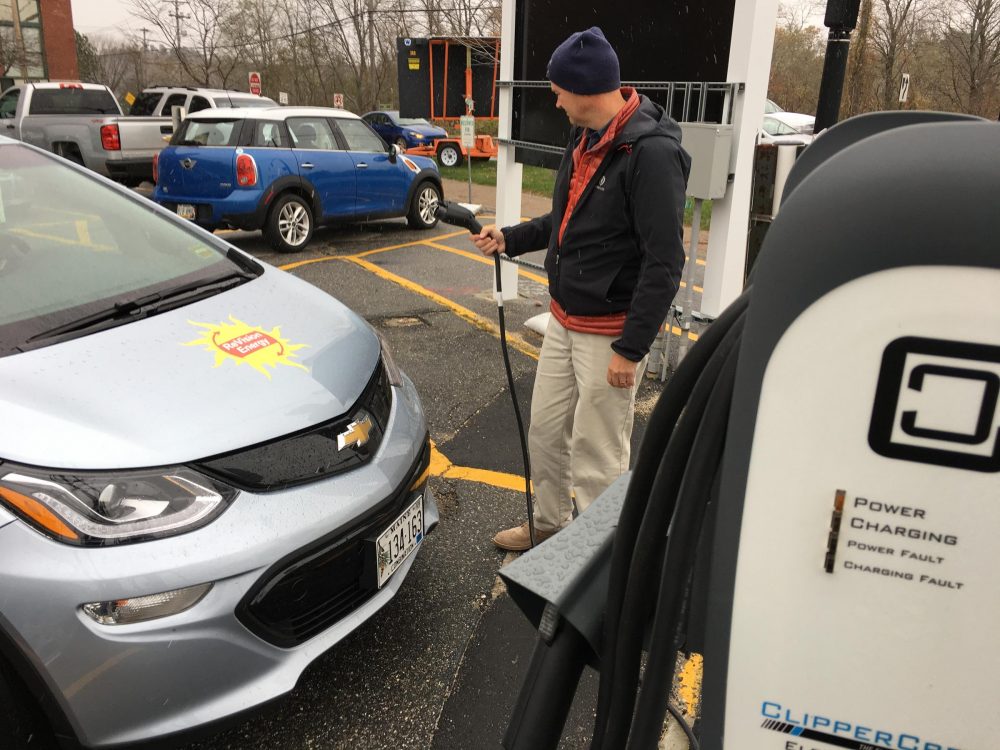Episode 71: Go or Stay

This week, we get an update the flow of migrants leaving the US to go to Quebec, and meet Puerto Ricans deciding whether to stay on the island or come back to New England. We’ll talk about housing for a rapidly aging population in Vermont, and learn how a the settlement dollars from a Volkswagen lawsuit could help spur electric vehicle use in Maine. Finally, we get a taste of what’s new about New England food.
Flight
Fearing the Trump administration’s stricter immigration policies, thousands have been fleeing the United States for Canada.
One policy change is the end of a temporary residency program for 59,000 Haitians allowed to legally enter the United States following an earthquake in 2010. The Haitians will have to leave the country by July 2019, or face deportation. That program has also ended for two thousand Nicaraguans. It’s unclear if other groups including 300,000 Salvadorans will be allowed to remain.

A man from Congo speaks with Royal Canadian Mounted Police officers after illegally entering Canada. The man from Congo was then frisked before being processed in the white trailer. Photo by Lorne Matalon for VPR
The net result is a continued flow of people crossing the border into Canada by foot. They take advantage of a Canadian law that says those who cross by foot won’t be turned back until their case is heard.
Reporter Lorne Matalon takes us back to the site of earlier reporting: the illegal boarder crossing at Roxham Road north of Champlain, New York.
Puerto Ricans have been facing similar questions about whether to relocate following the devastation of Hurricane Maria. Of course, Puerto Ricans who choose to leave the island to come to New England aren’t immigrants, they’re US citizens. WNPR’s Jeff Cohen reports on the lack of power and water across much of the island is causing a growing number of people to make hard choices.
A Few Years Down the Road…

Jan Belville decided to sell her large house in Brandon, Vt. to move into a senior affordable apartment. Bellville was on a a waiting list for almost five years. Photo by Howard Weiss-Tisman for VPR
In the 18 years after World War II, birth rates across America hit unprecedented levels. Demographers named that sizable generation the Baby Boom. Today’s baby boomers make up about 25 percent of the United States population.
As boomers head into retirement they’re rewriting the expectations we have about where and how senior citizens want to live.
As we’ve reported previously, New England’s population is older than most of the country. Given that Vermont is expected to have the oldest population in the nation by 2030, many baby boomers there are facing tough decisions about housing. Vermont Public Radio’s Howard Weiss-Tisman reports.
For more, check out “Aging Well,” a special VPR series exploring how the Baby Boom generation is viewing retirement and changing the future makeup of Vermont.

ReVision Energy’s Barry Woods charges up his company car in Brunswick, Maine. Photo by Fred Bever for Maine Public
Electric vehicles make up a fraction of the cars sold in New England. But new state policies – and a cash infusion from the settlement of Volkswagen’s pollution scandal – could speed the build-out of electric vehicle charging stations, and jump-start the region’s EV market. Maine Public Radio’s Fred Bever reports.
The Best Food in New England
“Local” has become the most important word in the world of New England food. “Local” grass-fed beef, locally-made sheep’s milk cheese, or restaurants that proudly list the names of local farmers that grow their food are all a growing part of this movement.
Amy Traverso is senior food editor for Yankee Magazine and NewEngland.com, and she’s been watching these trends. She’s an expert in New England food, and an advocate for it.
She says chefs and food producers are challenging the notion that New England’s traditional foods are stodgy and boring. Think dishes like lobster on black rice with brown butter aioli, or baked beans with pomegranate molasses.
Traverso is also in charge of giving out Yankee Magazine’s annual Editor’s Choice Food Awards – now five years in the running.
About NEXT
NEXT is produced at WNPR.
Host: John Dankosky
Producer: Andrea Muraskin
Executive Producer: Catie Talarski
Contributors to this episode: Lorne Matalon, Jeff Cohen, Patrick Skahill, Howard Weiss-Tisman, Fred Bever
Music: Todd Merrell, “New England” by Goodnight Blue Moon
We appreciate your feedback! Send praise, critique, suggestions, questions, story leads, and artisanal chocolate bars to next@wnpr.org.


